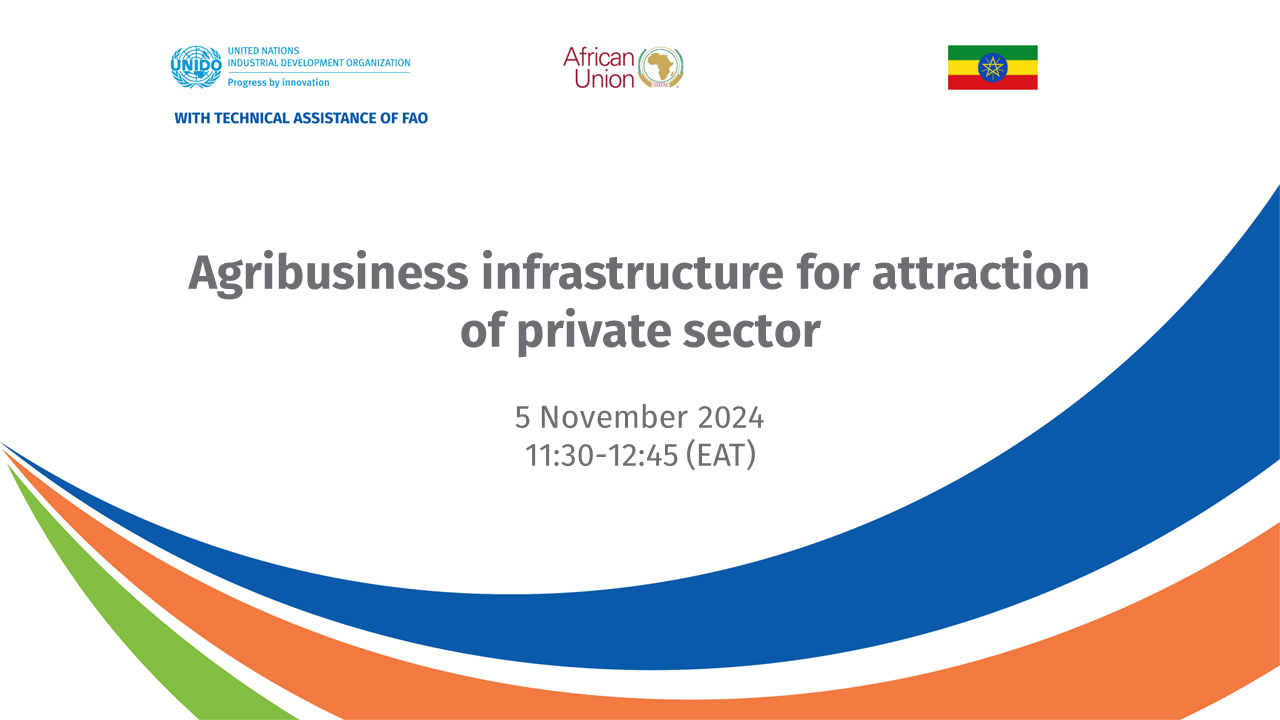


The issue:
The development of agri-business infrastructure has a direct impact on agricultural productivity as it links smallholder farmers to domestic, regional and global markets and ultimately fostering sustainability, competitiveness, and increasing overall productivity of the agro-industry sector. Various types of agri-business infrastructure, such as irrigation, (cold) storage, feeder roads, power supply, and shared services for agro-processing facilities, are crucial for enhancing productivity. Strategic investments in these areas, including logistics and climate-resilient technologies, are directly linked to improving food security, eradicating hunger, and addressing financing challenges.
Agricultural businesses need a safe and efficient transportation system to produce, distribute, and sell their products. Inadequate transportation networks and storage facilities contribute significantly to food loss and waste. This subsequently leads to substantial post-harvest losses, which in turn, negatively affect food security, farmers’ income, and competitiveness. Storage facilities, such as silos, warehouses, and cold storage, are essential for ensuring food security and eradicating hunger. They empower smallholder farmers by allowing them to negotiate from a position of strength, enabling them to decide when to sell their agricultural products to maximize income. This also grants them access to financing through innovative schemes such as commodity collateral financing, where farmers utilize certified stored products as a guarantee for loans.
Inadequate market facilities, such as the absence of wholesale markets, collection centres, and agro-processing facilities, along with poor quality infrastructure, limit efficient trade. The lack of well-equipped markets reduces transparency, hampers price discovery, and restricts access to market information. Investing in market information systems and digital platforms can improve market transparency and facilitate informed decision-making.
The aggregate effects of limited access to agri-business infrastructure undermine the value-addition process in agriculture by discouraging much-needed private sector investment. The lack of agro-processing infrastructure across most low- and middle-income countries (LMICs) disincentivizes investment in food production. It also makes it nearly impossible for food exporters to graduate from producing raw commodities to higher-value processed food products.
Addressing these challenges is critical for unlocking the full potential of agri-business and trade. Governments should prioritize investment in transportation infrastructure, storage facilities, cold chain systems, and market infrastructure. Public-private partnerships (PPPs) can catalyse private sector investment and expertise, ensuring sustainable infrastructure development.
Agro-industrial parks or zones are often seen as a strategic solution to address infrastructure challenges, linking farmers with processors, enabling value addition, and optimizing supply chains to boost productivity and market access. UNIDO is currently supporting their development in 16 countries, Ethiopia being a notable example.
Regional collaboration and integration initiatives can also address cross-border infrastructure challenges. For example, the African Union initiated the Common African Agro-Parks Programme (CAAPs) to create regional agro-industrial hubs that would increase the supply of locally produced agricultural goods, reduce reliance on food imports and promote value-addition to agricultural commodities. The programme envisions the creation of five large agro-industrial zones across Africa.
Similarly, the Alliance for Special Agro-Industrial Processing Zones (A-SAPZ) was created in 2023 to provide a financing mechanism for rural infrastructure. This financing platform has committed US$3 billion to expedite the development and execution of SAPZ projects across Africa.
Objectives:
This session aims to:
Assess the challenges facing LMICs in developing agri-business infrastructure to support efficient practices and value addition.
Explore case studies and innovative approaches to agri-business infrastructure development aimed at enhancing productivity, competitiveness and sustainability.
Leverage these innovative approaches to help countries address infrastructure gaps and improve post-harvest practices.
Key guiding questions:
How can agro-industrial parks improve productivity, efficiency and sustainability in the agribusiness sector while also facilitating better linkages between smallholders, SMEs, and larger agricultural enterprises?
What innovative technologies and approaches are being/can be utilized to improve agri-business infrastructure and enhance market access?
How can investments in agricultural infrastructure be optimized through innovative financing mechanisms and PPPs to address the diverse needs of smallholder farmers, agri-businesses, and rural communities?
Expected outcomes:
Identification of key challenges of agri-business infrastructure in LMICs, and actionable strategies to address these gaps.
Highlighting effective strategies such as the agro-industrial parks model, which delivers integrated agri-business infrastructure.
Development of concrete recommendations and policy plans to optimize investments in agricultural infrastructure, leveraging innovative financing and PPPs tailored to the needs of smallholder farmers and agri-businesses.
Format and structure:
A keynote presentation and a high-level panel discussion will showcase solutions for mobilizing public and private capital for developing strategic agri-business infrastructure required for the transformation of food systems.
Opening remarks

His Excellency Mr. Melaku Alebel, Minister of Industry, Ethiopia
Mr. Melaku Alebel is the Minister of Industry for the Federal Democratic Republic of Ethiopia, where he leads efforts to expand the country’s manufacturing base, boost exports, and drive economic transformation through industrialization. Previously, he served as Minister of Trade and Industry, enhancing trade policies and fostering industrial growth of the country. As Vice President of the Industry and Investment Bureau in Amhara Regional State, he led efforts to attract investment and promoted regional industrialization. His leadership is critical to Ethiopia’s ambitions of becoming a leading industrial hub in Africa.
Keynote speech

Ms. Josefa Leonel Correia Sacko, Commissioner for Agriculture, Rural Development, Blue Economy and Sustainable Environment, African Union Commission
Ms. Josefa Leonel Correia Sacko is the Commissioner for Rural Economy and Agriculture at the African Union Commission. She was previously the special adviser to the Minister of Agriculture on issues related to international cooperation. She served as Secretary General of the Inter African Coffee Organization (IACO) for 13 years, overseeing the coffee economy of 25 African Coffee producing countries. During her tenure, she successfully empowered small-scale coffee farmers across the continent by setting up Regional Centres of Excellence for Capacity Building on Genetic Material Conservation, Coffee Quality Improvement, and Cup Tasting Liquor in Cote d’Ivoire, Uganda, Cameroon, and Zambia.
Moderator

Mr. Kazuhiro Numasawa, Manager, Agriculture Finance and Rural Infrastructure Development, African Development Bank
Kazuhiro Numasawa, CFA has more than 22 years of experience in advisory and investments across sectors while focusing on development finance over the last 17 years. He is currently a Manager at the Agriculture Finance and Rural Infrastructure Department of the African Development Bank. Across 25 countries in Africa, he has identified and analyzed more than 60 investment projects over the past 13 years while working for the AfDB. He appraised a total of USD 2 billion investments in Africa. He is currently focusing on agriculture and food industries, especially Special Agro-Industrial Processing Zones with a portfolio of USD 1.7 billion covering more than 20 African countries.
Panelists

Mr. Mohammed Usman Abdul-Razaq, Senior Vice President, Africa Finance Corporation
Mohammed is Senior Vice President and Head of Capital Mobilization and Partnerships at the Africa Finance Corporation (AFC). With over 17 years of experience in development, impact investing, and infrastructure financing, he has led transactions totaling over $30 billion. Previously with Morgan Stanley and Renaissance Capital, Mohammed has structured projects that drive economic development in Africa. Recognized as a top economic leader under 40 by the Choiseul Institute, he also serves on the board of WARIF and founded the Dudden Hill Foundation, supporting young African entrepreneurs.

His Excellency Mr. Melaku Alebel, Minister of Industry, Ethiopia
Mr. Melaku Alebel is the Minister of Industry for the Federal Democratic Republic of Ethiopia, where he leads efforts to expand the country’s manufacturing base, boost exports, and drive economic transformation through industrialization. Previously, he served as Minister of Trade and Industry, enhancing trade policies and fostering industrial growth of the country. As Vice President of the Industry and Investment Bureau in Amhara Regional State, he led efforts to attract investment and promoted regional industrialization. His leadership is critical to Ethiopia’s ambitions of becoming a leading industrial hub in Africa.

Ms. Vanessa Adams, CEO and Founder, Level 4 International
Vanessa Adams is Founder and CEO of a boutique consultancy, Level4International. She has over 25 years of experience working to drive economic impacts at the last mile and improve supply chains in over 40 countries. She partners with SMEs and multinational companies, governments, development partners, industry associations, and cooperatives. She has spent over 20 years working to improve livelihoods in 30 African countries with institutions, businesses, women and youth entrepreneurs and farmers to increase productivity, meet buyer specifications, access finance, and compete in international markets. She has facilitated and created hundreds of transformative strategic partnerships with governments, multilateral organizations and businesses to develop and implement strategies which increase productivity and international trade, expand investments, improve business environments, access financial services as well as reduce constraints to economic growth. She is an advocate and champion of women and youth entrepreneurs, and smallholder farmers.
Vanessa has significant leadership and management experience, including as VP of Strategic Partnerships and USAID Chief of Party, leading Digital Ag, championing Gender and Inclusion towards implementing a $500M strategy at AGRA under the Partnership for Inclusive Agricultural Transformation in Africa. Previously, she led the USAID Southern Africa and West Africa Trade and Investment Hubs, including $70+ million USD projects with multi-cultural teams, facilitating over $300 million in exports from Africa, and catalyzed over $70 million in investments as well as over $140 million in credit. While living in West Africa, she contributed to founding several pan-African organizations including the African Cashew Alliance, Borderless Alliance, and Global Shea Alliance. She founded and grew several platforms including the Agribusiness Dealroom, and the Women in Agribusiness Leadership Network in Ethiopia, as well as Value4Her. She has been on numerous Steering Committees and Advisory Boards including the Farm to Market Alliance and AWIEF (African Women Innovation and Entrepreneurship Forum).
Vanessa has an Executive MBA from INSEAD.

Mr. Abah Ofon, Senior Manager, Export Development Advisory, African Export-Import Bank
Mr. Abah Ofon is Senior Manager, Export Development Advisory, at the African Export-Import Bank, a pan-African multilateral trade finance institution created under the auspices of the African Development Bank. Mr. Ofon has over 24 years’ macroeconomic, commodities, trade and research experience in financial markets in Africa, Asia, the Middle East and Europe. Prior to joining Afreximbank, he was lead analyst at the London firm Agribriefing, head of agri- commodity research and Africa economist for Standard Chartered Bank’s global franchise based in London, Dubai, Singapore and Malaysia. He has provided advisory services on commodity markets to some of the largest agribusiness names and institutional clients including hedge funds and central banks.